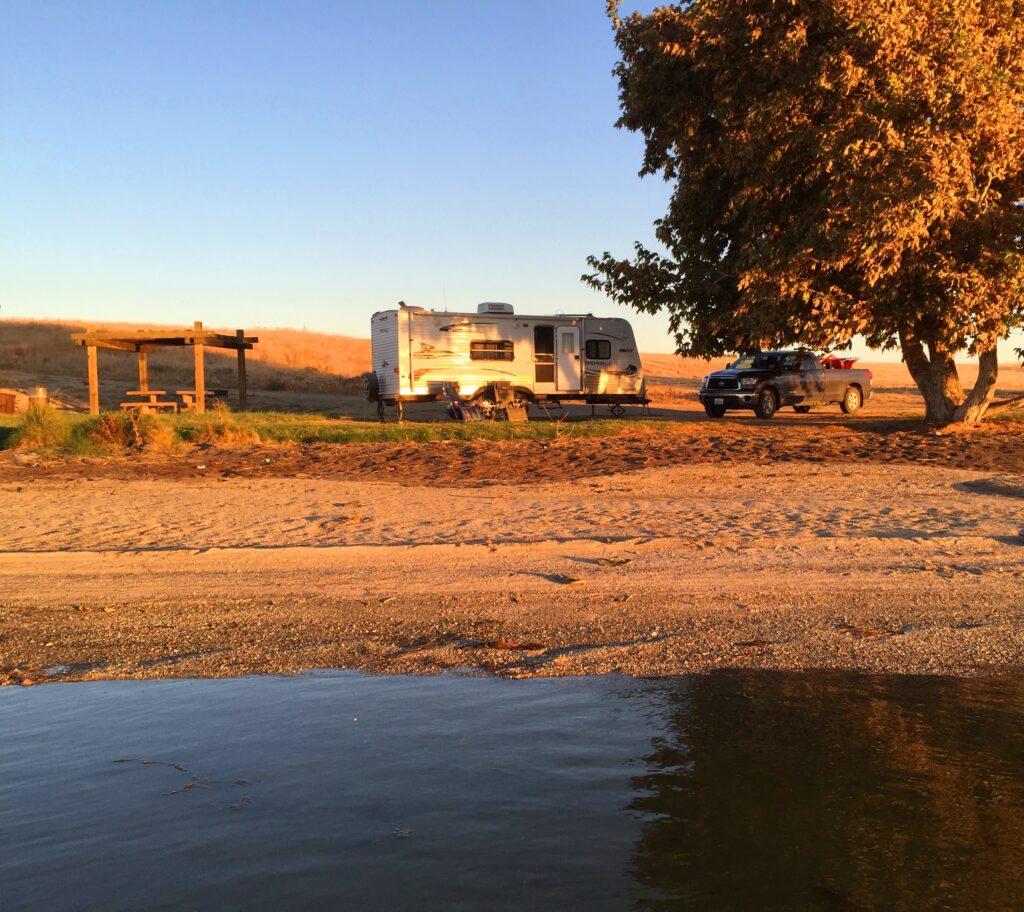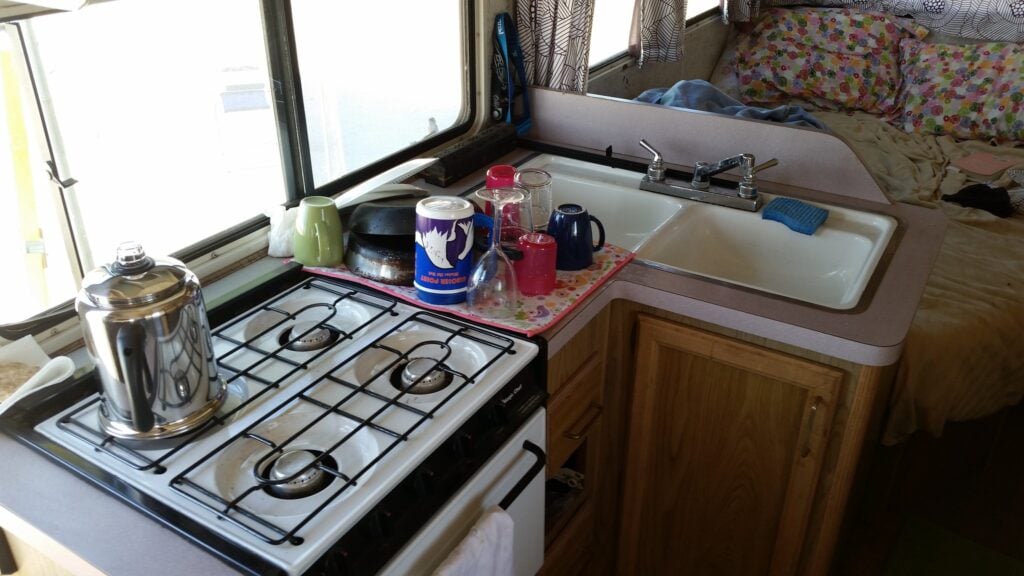
Save tank space with five no-brainer grey water hacks
Those of you that have been RVing for a while know the grey tank will reach capacity long before the black tank, and most likely before you deplete your potable fresh water tank as well.
To be able to extend the time you spend dry camping, you will need to learn some ways to minimize the amount of wastewater that enters your grey tank.
1. Use a dish pan in your sink.
Purchase a dish pan that will fit in the kitchen sink of your RV. When you finish doing the dishes consider “disposing” of the dishwater in one of four ways rather than sending it down the kitchen drain to the grey tank:
- Use it to quench the evening campfire.
- Dump it down the toilet into the black tank.
- Save it in a gallon milk jug and use it to flush the toilet.
Remember the black tank seldom fills up before the grey tank. Take advantage of the “extra” space. In addition, the soapy dishwater will help keep your black tank clean.
Be sure to use environmentally-friendly biodegradable dish soap if you will be disposing of dishwater on the ground.

One of our favorite grey water hacks is to use a dish pan in the sink while doing the dishes. Photo by Mitch Barrie
An aerated showerhead utilizes less water than the showerhead that came with your RV, and the on/off feature will allow you to take “Navy Showers.” Less water used equals less wastewater in your grey tank.
Read more about the best types of showerheads in this Do It Yourself RV article.
3. Purchase a sewer cap with a hose connection.
This handy device allows you to adapt a non-potable garden hose to the 3” termination outlet on your RV and dispose of grey water in one of two ways:
- Where legal (not as many places as they were a few years ago) or with a rangers permission, you can slowly drain your grey water onto the ground in the boondocks. Dig a sump first, be sure to filter out small food particles with a screen to avoid attracting pests and cover when done.
- Route your grey water into an approved wastewater sump.
4. Spray your dishes before washing them.
Purchase a spray bottle and fill it with a mixture of dish soap, water, and a little vinegar. Spray the mixture on dirty dishes and wipe before washing which will greatly reduce the amount of water required to finish washing them.
Less water used equals less wastewater in the grey tank. Dawn dish soap is a favorite among many RVers.
5. Recycle your RV grey water.
The granddaddy of all grey water hacks is to recycle wastewater from your grey tank to flush the toilet.
This grey water hack employs a pump and filter to draw wastewater from the grey tank and uses it to rinse the toilet in place of potable water. This is the same concept as the last point in Hack #1, but a lot more convenient. Learn more about this hack here.
Cheap RV Living shared some great tips on disposing of grey water when boondocking in this Youtube video:
Find more boondocking hacks to save tanks space
The next time you find yourself dry camping, consider which of these grey water hacks would work best for you and see how much longer you can extend your stay before filling the grey tank. You can also find great advice from fellow RVers on iRV2 Forums as well as in this article on RV Grey Water: What Is It & How To Dispose Of It.

You can also by another gate valve and keep it connected to the termination. Keep this valve closed and open both gray and black. The tank levels will equalize and you’ll have more space for your gray water.
I totally disagree with Dave’s suggestions that you dump gray water on the ground or use it to put out your campfire. All water from washing dishes contains food residue and smells which attract animals and can make them sick. You wouldn’t dump the wash water from your kitchen sink into the backyard of your house – why would you dump it on the ground just because you are in the wilderness? That’s wildlife’s backyard.
While in BLM’s LaPosa LTVA,we asked about shower water when showering outside. We were told that as long as the shower water never hits the grey water tank it’s not “grey”. The ranger did request that we ALWAYS use biodegradable soap whether showering outside or in the rig because if dumping that stuff goes into an oversized septic tank like system and biosoaps dont kill the bacteria that is needed.
When traveling on remote country roads, I remove the cap open the gray tank valve slightly until there is a small stream. In a few minutes the tank is drained. I can do this without harming the environment by using nothing but natural biodegradable dish soap hand soap and shampoos
My hack is catch the shower water that’s cold before the “instant on” water heater actually heats the water. Then I have water to rinse dishes. I use a spray bottle of Dawn and water. I spray water on the dishes and sponge. Then spray the soap mixture. Wash everything at one time. Then rinse with my saved water. I can do a sink full of dishes with a half gallon of water. Of course, I wipe out as much food as possible before washing to prevent to much food stuff from going into the grey tank.
Very good ( thank you )
prior to washing dishes, we wipe all dishes, pots pans etc with a paper towel. It removes food particles and and much grease or oils. This gets most plates “clean” prior to washing with soap
I believe it is still against the law to dump your grey tank on public land. One concern is the food particles and other stuff will attract insects. I haven’t stayed at any State or National park that has approved dumping grey water onto the ground.
Hoping someone can help me. I am converting a shuttle bus into a home and made the mistake of having the shower drain sitting below my grey water tank. (Just stupid)
Is there any way I can get the shower water up into the grey tank?
Thanks for your time….best wishes
Ron
Ron, look for different kinds of sump pumps. You should be able to create a setup that works, it may require some creativity but it’s doable.
Ron, check out this video. They show how to pump shower drain water to the grey tank.https://www.youtube.com/watch?v=pF0qgEwUCkY
John
It is a crime (most areas only a misdemeanor some places a felony), adult or child/baby’s diapers.
one needs to find a sanitary way to dispose of such, diapers are to be scraped “clean” before placing into the trash. there is a lot of things living in human poop that can hurt or even kill people, dog stuff, does not do such to humans. –cross species thing–.
letting any liquid fall off your rig is a crime (fed DOT thing). only things allowed to fall off is clear water, and feathers from live birds.
I use a bowl in the bathroom sink and use that water in the black tank when I am Boondocking
We use as much paper service as possible, thus reducing the dishes that need to be washed. The paper products then go in a trash bag and are taken home to be composted.
Paper towels are used to thoroughly wipe items that require washing, and these go in the composting bag.
Our small Z-frame has no gray water tank, so it is collected in a six-gallon plastic Jerry Can. The can is emptied into a dump station when possible, or into outhouse. If necessary, it goes into Mother Nature- well away from camp site, trails, water features and the like. A good site is a clump of juniper bushes, sprinkling it widely.
We use paper plates and put in recycling where we can.
I read a story about a woman who had a tray filled with rocks sitting in the sun and let the gray water drip onto the hot rocks to evaporate the water
Before washing dishes use an all natural pre-cleaner to completely and thoroughly wipe the dishes clean. They even remove hard baked on food. They come in a variety of sizes and colors. Ours weighs about 65 lbs and barks if we forget to put the plates on the floor for her.
Fezziwig,
The 65 pounder is a good idea, depending on the breed. Many dog and cat breeds cannot tolerate most, if any people foods; especially cooked or “processed” foods, spices, marinades, grilling rubs, condiments, etc. Also, even very small bone fragments can mess up (harder to digest in small animals) or lacerate a small animal’s digestion system (from experience and a severe chewing out from my vet). That’s why many small predators do not eat bone. They usually break the bone open to get the marrow but don’t eat the bone (part of my vet’s chastisement).